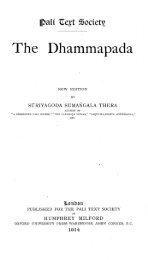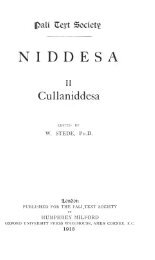Lessons In Practical Buddhism - Sirimangalo.Org
Lessons In Practical Buddhism - Sirimangalo.Org
Lessons In Practical Buddhism - Sirimangalo.Org
Create successful ePaper yourself
Turn your PDF publications into a flip-book with our unique Google optimized e-Paper software.
are negative, they are objectively so, and it can only be out<br />
of ignorance that we cling to them. They more clearly we<br />
understand them for what they are, the less we will be<br />
inclined towards them, until it becomes impossible for our<br />
minds to give rise to them because we understand them to<br />
be of no benefit whatsoever.<br />
When we remind ourselves of the reality of our experience<br />
and cease judging, we change the habitual cycle of the mind.<br />
We transform the mind’s programmed reactivity, its<br />
tendency to respond to experiences with immediate desire or<br />
aversion, into a new sort of interaction based on impartiality<br />
and acceptance, just by accepting things: “they are what<br />
they are.” When we are angry, we say to ourselves: “angry,<br />
angry…”. When we want something, “wanting, wanting…”.<br />
When we feel depressed, etc., “depressed, depressed…”,<br />
“stressed, stressed…”, “worried, worried…”, “confused,<br />
confused…”, “doubting, doubting…”, and so on.<br />
This moment-to-moment clarifying of each individual<br />
experience has a corresponding moment-to-moment effect<br />
on the addiction cycles that occur in the brain, and thus a<br />
verifiable and profound impact on one’s life. This is the work<br />
that we undertake as Buddhist meditators; it is a very<br />
simple, rational and non-dogmatic method to create true and<br />
lasting understanding and clarity of mind; it is the work that<br />
all beings must undertake to become free from suffering. It<br />
the practice, in regards to which, we use the word<br />
“mindfulness”.<br />
According to the Abhidhamma:<br />
What is sati? Whatever remembrance follows after –<br />
re-remembrance, an act of remembrance, memorization,<br />
non-shifting, non-floating, non-forgetting, the faculty of<br />
remembrance, the power of remembrance, right<br />
remembrance – this is called satindrīya (the faculty of sati).<br />
It is called “sati” because of the meaning of “remembrance”<br />
– this word gives the intrinsic nature of sati.<br />
It is called “remembrance following after” because of the<br />
meaning to remember often or remember in the present.<br />
The condition of remembering is called the act of<br />
78












